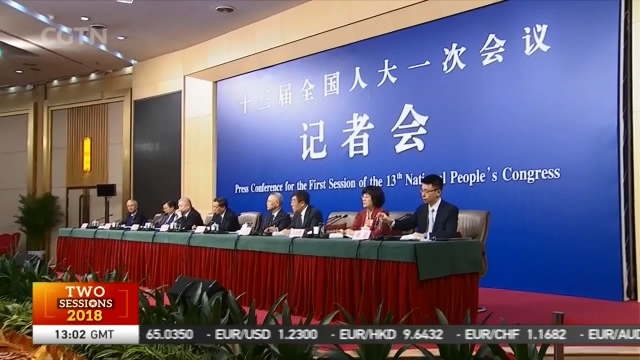
21:31, 12-Mar-2018
China's Political Season: Revised securities law passes second review

A revised securities law that protects investors' rights among other things passed the NPC Standing Committee's second review. That's according to the vice chairman of the NPC Financial and Economic Affairs Committee on Monday. Timothy Ulrich has more.
Wu Ritu, vice chairman of the NPC Financial and Economic Affairs Committee said that the committee initiated the drafting of the Securities Law in 2013. The NPC standing committee was invited to conduct a preliminary review in April 2015. He said all parties have endorsed the reform direction of the IPO registration system but there are different views on when to introduce the reform. The measure still faces additional reviews.
WU RITU, VICE CHAIRMAN NPC FINANCIAL & ECONOMIC AFFAIRS COMMITTEE "Everybody may remember that in 2015, there was an unusual fluctuation in our stock market, which is obviously not appropriate for the introduction of the IPO registration system. In order to actively and steadily advance this reform, the State Council proposed to explore this reform before completing the revision of the Securities Law."
China's top security regulator, Liu Shiyu, reported to the NPC Standing Committee on the reform of the IPO registration system in February. He pointed out that the Chinese market was not well prepared for the registration system. The NPC Standing Committee decided to delay the authorization deadline of the registration-based IPO mechanism to Feb. 29th, 2020.
WU RITU, VICE CHAIRMAN NPC FINANCIAL & ECONOMIC AFFAIRS COMMITTEE "The IPO registration system reform is only one key part of the revision of our securities law. The construction of a multi-tiered capital market system, the supervision of the securities market, and protection of the investors' rights and interest are also important parts of the securities law."
Wu Ritu said that his committee was responsible for drafting and delivering 33 pieces of law over the past five years. That accounted for one third of the total legislative agenda. Seventeen laws have been approved and enacted. Wu also said that China will speed up the implementation of tax laws. He said that six of 18 taxes in China have been imposed under state laws while the remainder are still being charged by state regulation. He said that taxes on arable land and consumption are still being considered.

SITEMAP
Copyright © 2018 CGTN. Beijing ICP prepared NO.16065310-3
Copyright © 2018 CGTN. Beijing ICP prepared NO.16065310-3